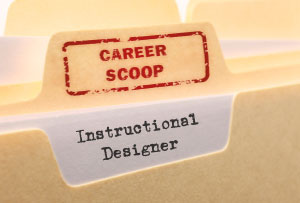 Career Insight: Instructional Designer
Career Insight: Instructional Designer
In a nutshell, what do you do?
I design and develop customised online training for companies. I work for myself from home.
Why did you choose this career?
I enjoy creativity, helping others and making something that is complex, simple. Designing programs is also driven by project deadlines, so for me, that gives me flexibility with the kids and work / life balance. As long as I meet the deadlines, that’s all that matters – not what time I’m sitting at my desk.
What path did you take into it?
I started in Human Resources with a bachelor of business degree. I soon learned that I enjoyed Learning & Development, so completed a Post Grad in Industrial Education and Training. I was promoted into a Learning and Development Coordinator role and managed the company’s Learning Management System, and facilitated training.
I then moved into an Instructional Designer role as a contract with Accenture Learning. The next role was a Senior Learning and Development specialist, which involved developing and facilitating online and face to face programs for a large retailer.
At that point I completed a Masters in Adult Education and took a full-time role as a Senior Instructional Designer for a major financial institution. I fell pregnant, so started my own business developing online training for organizations – which is where I’m at now.
What, in your opinion, is the best bit of being an Instructional Designer?
Creativity and flexibility. The challenge of turning complex content into something an everyday person can understand.
Every job has its downsides. What do you think are the worst bits?
When a client wants to continuously change their mind, add more content than is unnecessary and laboriously continue to edit upon edit. Also having to be assertive and say that any more changes will cost them (as time is money).
Is it what you expected when you first started out?
Yes, it is. It’s great to work for yourself and have the satisfaction of being paid for a job well done. I just have start enjoying my time off and not feeling guilty for all the poor people that have to trudge into work everyday, whilst I’m sunning myself at the beach on a week-day!
What do the public least understand – or mistake – about what you do?
Some people get a shock when they see the price. There is a misunderstanding that I create special PowerPoint slides. In fact, it takes usually about 3 months for 1, 20 minute module to be made, with the involvement of others, such as a graphic designer and developer.
What kind of people tend to do well in this kind of career?
People-oriented, intuitive, self managed, excellent comprehension skills, can think on their feet, not easily turned off by complex concepts, have a love of learning and helping others, can think outside the square.
Attention to detail is a bonus but can be compensated by having others check your work before going to a client for review. An education background is advantageous or some understanding of how people learn.
Finally, any advice you’d offer to people looking to get into this line of work?
People usually come into is line of work as an expert in a particular topic, so they become a trainer for face-to-face, start writing procedures / manuals for the topic and then get asked to put it online…
The other way is through education. ASTD have a lot of excellent courses and books you can do to learn the essential skills. AITD also have courses available. After that it’s a matter of getting a foot in the door in a junior role and being mentored by others.



